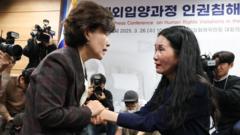South Korea’s Truth and Reconciliation Commission has released a shocking report admitting to human rights violations in a program that exported over 170,000 children for adoption between 1960 and 1999. The findings indicate that the government enabled "mass exportation" through inadequate oversight of profit-driven private agencies, resulting in various forms of fraud, misinformation, and coercion.
The commission, led by chairperson Park Sun-young, held an emotionally charged press conference where she addressed the legacy of trauma suffered by many adoptees and their biological families. She remarked, “This is a shameful part of our history,” noting that while some adoptees found loving homes, others faced hardships due to flawed processes.
The inquiry, which commenced in 2022, has received petitions from 367 adoptees alleging fraudulent practices, with 100 petitions examined, identifying 56 adoptees as victims of human rights violations. As the investigation continues, it’s evident that systemic failures allowed foreign agencies to dictate the flow of adoptions, creating a primarily profit-driven environment devoid of adequate safeguards.
The report outlines how private agencies involved in the adoptions committed various lapses: from securing consent from birth mothers to screening adoptive parents. Some agencies resorted to fabricating abandonment stories to expedite adoptions, leaving many adoptees with false identities that have hindered their search for their birth families.
In response, the commission has urged the government to issue an official apology and align its practices with international adoption standards. The government has shown responsiveness recently by implementing stricter regulations, such as a 2023 law mandating government oversight over all adoptions instead of allowing private agency control, effective in July.
Among the petitioners is Inger-Tone Ueland Shin, who was adopted by a Norwegian couple at the age of 13, only to learn later that her adoption was illegal. Her harrowing experiences in Norway included alleged abuse, highlighting the long-lasting impacts of these adoption processes.
“I have been living in the wrong country and I have had a painful and miserable life,” Inger-Tone expressed. As South Korea grapples with this troubling segment of its history, the ongoing investigations signal a step towards accountability and reconciliation for those affected.


















